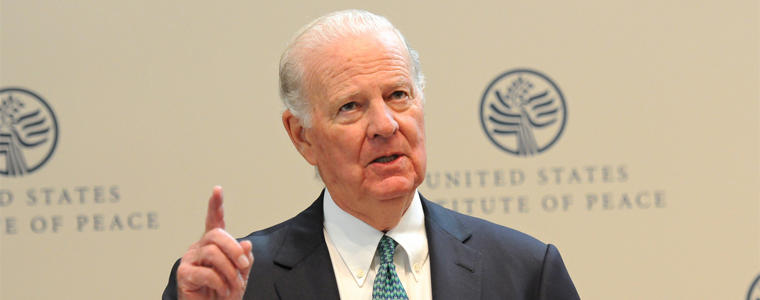Texas Peacebuilders
The United States Institute of Peace proudly recognizes the ongoing work of the State of Texas in growing connections ranging from young people and technology to women in peacebuilding.

The United States Institute of Peace (USIP) proudly recognizes the ongoing work of the State of Texas in growing connections ranging from young people and technology to women in peacebuilding.
Texas’ longstanding history of concern for how international conflict may be resolved or settled through nonviolent means has made the Lone Star State a significant USIP partner. The federal funding directed to Texas supports a variety of programs to benefit international peacebuilding and education.
Working with many universities, nongovernmental organizations and practitioners in Texas, the Institute is working to advance the field of international conflict management and contribute to national security by engaging those who work on global issues. A few examples:
In November 2011, the Baker Institute and the USIP co-hosted "Twenty Years After Madrid: Lessons Learned and the Way Forward for Arab-Israeli Peacemaking," a major all-day conference in Washington, D.C.
The conference began with opening remarks from Baker Institute founding Director Ambassador Edward Djerejian and USIP President Ambassador Richard Solomon, followed by a video interview with former President George H.W. Bush. Below, the Honorable James A. Baker, III, former secretary of state, is pictured with members of the U.S. delegation to the 1991 Madrid Peace Conference (from left to right): Gemal Helal, the Honorable Daniel Kurtzer, Baker, Djerejian, the Honorable Dennis Ross and Aaron David Miller.

Baker, who served as 61st U.S. secretary of state, gave the keynote address, in which he recalled the historic 1991 conference, the first official face-to-face peace negotiation involving Israel, Jordan, Syria, Lebanon and the Palestinians.
In education, the most recent top winner of the 24th Annual National Peace Essay Contest for High School Students hailed from the Lone Star State. Kathryn Botto, who attended the Liberal Arts and Science Academy in Austin, Texas, was the national first place recipient of scholarship money based on her essay “Mimes for Good Governance: The Importance of Culture and Morality in the Fight Against Corruption.” This year’s National Peace Essay Contest is now underway.
USIP Chief of Staff Paul Hughes has briefed international relations, Middle East studies and U.S. Army Reserve Officers Training Corps classes at Baylor University about the Institute’s peacebuilding mission in Iraq and facilitation of the Quadrennial Defense Review and the Congressional Commission on the Strategic Posture of the United States.
This month USIP hosted Egyptian women on a visit arranged by former First Lady Laura Bush as part of a new fellowship program started by the George W. Bush Institute that the Bush family established in Dallas. USIP remains deeply committed to increasing the role of women in international peacebuilding.
Next month (April 23) USIP will conduct the USIP Southwest Regional Grants Workshop in collaboration with Southern Methodist University to advance best practices in grantmaking in the field of international conflict management and peacebuilding. Over the years, USIP has made 10 conflict resolution and peacebuilding-related grants to universities and nongovernmental organizations in Texas and funded research, training, and education programs at such institutions as Rice University, the University of Houston, the University of Texas, Austin, and the University of Texas, Dallas.
USIP’s senior program officer in the Rule of Law Center, Vivienne O’Connor, has been asked by Congresswoman Eddie Bernice Johnson to participate in “Women, Technology, & Peacebuilding” conference in Dallas (April 28). The theme of this year’s conference, organized by Congresswoman Johnson, is “Technology and Peacebuilding.” O’Connor will discuss the USIP-sponsored International Network to Promote the Rule of Law (INPROL), a global, online community of practice comprised of some 1,900 rule of law practitioners from 80 countries and 300 organizations.
USIP works closely with Fort Worth district Congresswoman Kay Granger, chairwoman of the House Appropriations Committee's Subcommittee on State, Foreign Operations and Related Agencies. As one of the chairs of the 12 House Appropriations Committee subcommittees, she oversees America’s international diplomacy, foreign aid, and peacebuilding funding.
“Congresswoman Granger is a fearless leader and common sense advocate for sensible U.S. international engagement aligned with national security and America’s values,” USIP Chief Financial Officer Mike Graham said. “She understands the importance of building international peace to the nation’s security and economic interests.”



